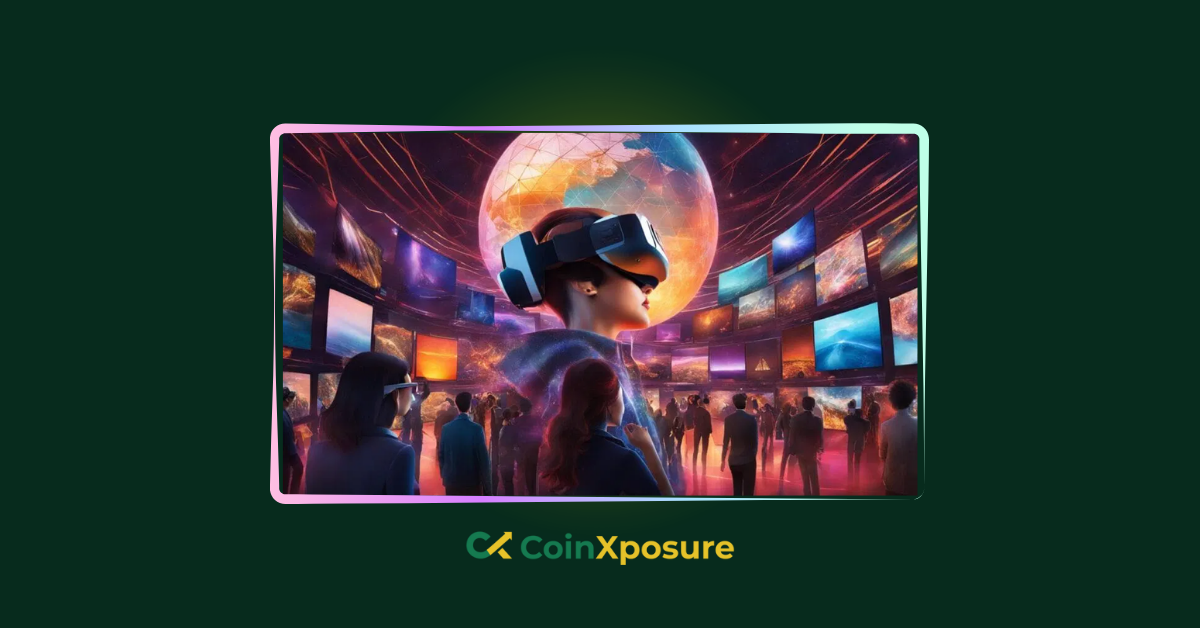Virtual reality (VR) is quickly gaining in popularity, and several sectors are developing creative methods to use it in their daily operations. As with any new technology, there are worries about ownership, transparency, and security.
Blockchain technology, which was first created for cryptocurrency, may resolve these issues in VR systems. Blockchain is a decentralized, transparent, and unchangeable ledger that can increase ownership, security, and transparency.
This article will examine how blockchain technology may enhance security, increase transparency, and provide ownership in order to show how VR platforms might benefit from it.
Explanation of Blockchain Technology
A distributed, decentralized digital ledger called blockchain technology records and validates transactions. It comprises a network of computers or nodes that collaborate to keep track of a shared ledger of encrypted transactions.
Each node on the network replicates the ledger and is continuously updated when new transactions are added.
A timestamp, a distinct digital signature, and a cryptographic hash of the preceding block are all included in each blockchain block. The ledger’s integrity is ensured by creating an immutable chain of blocks that cannot be changed or tampered with.
Since the blockchain is decentralized, no single entity is in charge of running the network. Instead, the network’s nodes reach a consensus to confirm transactions. Due to the real-time verification and recording of all transactions on the blockchain, it is a very safe and transparent system.
The potential of blockchain technology to enable safe and transparent transactions without the use of intermediaries is one of its main advantages. Smart contracts, which are self-executing contracts with the terms of the agreement put directly into code, are used to do this.
Intelligent contracts may automate business processes, verify that the contract’s requirements are followed, and guarantee the security and transparency of business dealings.
Blockchain technology offers various uses outside of financial transactions, including supply chain management, voting systems, identity verification, etc. As a result, it can completely transform different businesses by enabling safe, open, and unfalsifiable transactions.
Explanation of Virtual Reality (VR) Platforms
Virtual reality (VR) platforms imitate a user’s physical presence in a virtual environment using computer-generated settings. For an immersive experience, they often require a headset or other VR gear. Users may communicate with the virtual environment through controllers or other input devices.
VR systems may be used for various purposes, including simulations, training, teaching, and gaming. They offer a distinctive and immersive experience by enabling users to encounter places and events that would be challenging or impossible to duplicate in the real world.
VR platforms need a powerful computer to produce the high-quality images necessary to create a realistic virtual environment in addition to the headgear or VR device. For a more realistic experience and to detect the user’s motions, several VR platforms additionally need extra sensors and gear.
New technology and software are being created to enhance user experience and enable new applications, and the VR business is expanding quickly. VR platforms are anticipated to grow in popularity as technology advances and become more widely available for various purposes, including entertainment, education, and business.
Overview of The Benefits of Blockchain in VR Platforms
Improved security, transparency, and ownership are advantages of blockchain technology in VR platforms. Blockchain technology can boost security by supplying a decentralized and immutable ledger that can prevent data misuse, enable safe and transparent transactions, and make VR platforms more resilient to cyberattacks.
Offering a decentralized, immutable, and auditable system that can guarantee the quality and completeness of the data being recorded and give individuals more control over their data may also promote transparency.
Additionally, blockchain technology can facilitate greater ownership of digital assets by offering a decentralized and secure mechanism for digital asset ownership and allowing users more control over their investments. This will help the VR business expand.
Incorporating blockchain technology into VR systems has the potential to completely transform how we interact with and utilize VR by making it more user-centric, safe, and transparent.
Enhanced Security
Blockchain technology offers a secure and decentralized mechanism for data storage and transit, which can improve security in VR systems. With blockchain, it is challenging for unauthorized parties to access or change the data since it is spread over a network of nodes and safeguarded using cryptographic protocols.
Using blockchain technology in VR platforms has several advantages, including the potential to facilitate safe and open transactions. Smart contracts, which are self-executing contracts with the terms of the agreement explicitly put into code, are a feature of blockchain technology.
These contracts may be used to automate transactions, guarantee the fulfillment of the contract’s requirements, and assure the security and transparency of such transactions.
Blockchain technology may make a secure access control system possible, guaranteeing that only authorized users can access particular VR system components. Smart contracts can be used to do this since they can implement preset access control rules in a tamper-proof way.
Additionally, blockchain is decentralized, making it more difficult for hackers to control or infiltrate the system, making VR systems more resilient to cyberattacks. Blockchain technology reduces the possibility of a single point of failure by dispersing data over a network of nodes, making it more challenging for attackers to obtain illegal access.
By offering a safe, open, and decentralized method for data holding and transmission, the implementation of blockchain technology in VR platforms can improve security. With blockchain, access to the system may be managed via the use of access control mechanisms, and transactions are protected through the use of smart contracts.
Additionally, blockchain technology’s decentralized structure makes VR systems more resistant to cyberattacks, giving consumers a safer environment.
Transparency
Another issue with VR platforms is transparency since consumers may not always be aware of the data being gathered or how it is utilized. User confidence can be damaged by a lack of openness, which increases the risk of data exploitation.
By offering a decentralized and immutable ledger, blockchain technology can improve transparency in VR systems. Each block in the blockchain is related to the one before, sois challenging to change or modify prior records.
This allows all transactions and data inputs to be recorded and validated in real time. Users will therefore be able to trust the accuracy and completeness of the data being captured more.
Individuals may have more control over their data thanks to blockchain technology. Users may decide how their data is used and who can access it through smart contracts. Users will benefit from having more transparency and control over their data and assurance that it will only be used for the purposes for which it was collected.
Additionally, blockchain technology can promote better openness in VR’s hardware and software supply chain. For instance, it may be used to monitor the manufacturing and distribution of VR equipment, verifying the authenticity of each component and the absence of fraud or other illegal activity in the supply chain.
By offering a decentralized, immutable, and auditable system that can help prevent data misuse, give users more control over their data, and increase transparency in the supply chain for VR hardware and software, the use of blockchain technology in VR platforms can improve clarity.
Ownership
Users may not always have complete control over the digital assets they generate or the information they consume. Therefore ownership is another major issue in VR platforms. Due to consumers’ possible reluctance to spend time and money on a platform where they do not have complete ownership and control over their assets, this lack of ownership may restrict the potential for development in the VR business.
Blockchain technology offers a decentralized and secure framework for digital asset ownership, which can assist in addressing ownership problems in VR systems. Blockchain enables the transparent and tamper-proof recording and transfer of ownership of digital assets, giving consumers more control over their investments.
Users could own their avatars, virtual goods, and other digital assets on a VR platform built on a blockchain, with ownership being tracked on the blockchain. This would allow users to give others ownership of their assets, sell them on online markets, or even utilize them on other VR platforms.
Additionally, blockchain technology can enable better management of copyright and IP rights in VR content. Blockchain enables the safe and transparent recording of ownership of digital property, preventing copyright infringement and allowing authors to be appropriately rewarded for their labor.
In summary, incorporating blockchain technology into VR platforms can offer a decentralized and secure system for digital asset ownership, giving users more control over their assets and laying the groundwork for developing the VR sector.
Conclusion
Consumers of VR platforms stand to gain significantly from integrating blockchain technology, including improved security, transparency, and ownership. VR platforms may offer a safe and open environment for users to communicate with one another and digital assets by utilizing blockchain’s decentralized and unchangeable characteristics.
Additionally, blockchain technology ensures consumers have more control over their assets, enabling greater ownership of digital assets and laying the groundwork for developing the VR sector.
A safe and open environment for consumers, the ability to create new VR experiences, and industry innovation will all be made possible by using blockchain technology as the virtual reality (VR) market continues to expand.












